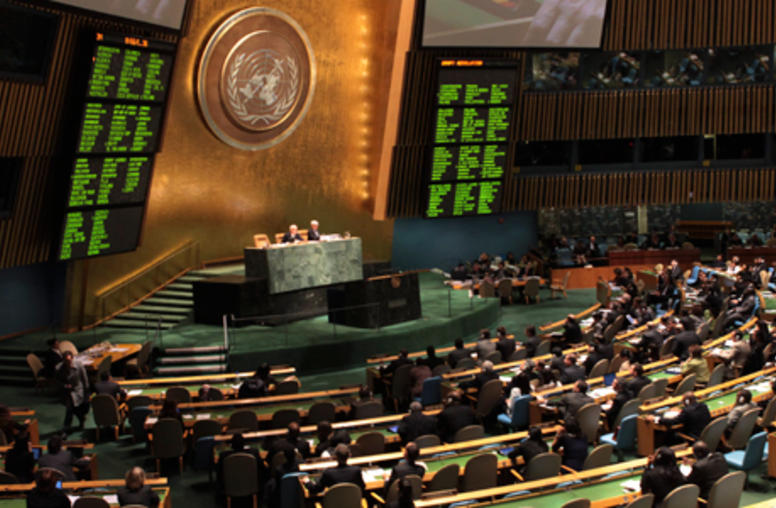Publications
Articles, publications, books, tools and multimedia features from the U.S. Institute of Peace provide the latest news, analysis, research findings, practitioner guides and reports, all related to the conflict zones and issues that are at the center of the Institute’s work to prevent and reduce violent conflict.
As Violence in Syria Worsens, U.S. Withdraws Embassy Staff
After several days of intensive negotiation, Russia and China vetoed a United Nations Security Council resolution on Saturday, February 4 that would have required Syria to implement the terms of an Arab League transition framework. USIP's Steve Heydemann assesses the current situation.
Making Sense of the U.N. Impasse on Syria
Abiodun Williams discusses the U.N. Security Council's rejection of a resolution on the violence in Syria and its implications for "Responsibility to Protect." Williams is acting senior vice president of USIP’s Center for Conflict Management (CCM), where he leads its work in conflict zones such as Afghanistan, Iraq, Pakistan, the Middle East and North Africa.

Need for International Peacekeeping Missions on the Rise
The Arab League this month called for the U.N. Security Council to approve a joint Arab-U.N. peacekeeping mission in Syria, where more than 5,400 people have died as the regime of Bashar al-Assad presses a brutal military crackdown on a popular uprising in Homs and other cities. Russia and China vetoed an earlier Security Council resolution on Syria, and it is not clear how seriously the recent Arab League proposal will be considered. The Arab League has scrapped its monitoring mission in Syr...
The Challenges and Opportunities Ahead for the Friends of Syria Group
As Western and Arab powers established a Friends of Syria Group, USIP’s Steven Heydemann examines the group’s agenda – and the top priorities for the U.S.
Mass Atrocities in Syria: the International Response
USIP’s Scott Lasensky and Lawrence Woocher discuss the growing concerns over crimes against humanity being committed in Syria.
Steven Heydemann on International Diplomatic Pressures on Syria
USIP Mideast expert Steven Heydemann examines the reasons behind the regime's escalation of violence, the international community's response, and additional steps that the U.S. might take to pressure the Assad government.
Brimmer Rejects Criticisms of U.N. at USIP Event
Taking on congressional critics of the United Nations, a senior State Department official told an audience at the United States Institute of Peace (USIP) on September 7 that the Obama administration’s multilateral diplomacy at the U.N. has bolstered U.S. security but that “backwards” calls to cut or further restrict U.S. funding for the world body, if enacted, would harm U.S. global influence.
Syria's Opposition
The uprisings in Syria that started in March have sparked international condemnation and concern over human rights abuses by the Assad regime. USIP’s Steven Heydemann discusses the state of Syria’s opposition and why the U.S. may be hesitant to recognize an emerging opposition.
USIP Conference Assesses Social Media’s Role in Conflict
The new role of social media in popular revolutions and other political change is not the inevitable force for good some commentators portray it as, but its complicated effects are promoting a wider transfer of geopolitical power from traditional nation-states to individuals and institutions, according to speakers at a conference held at the United States Institute of Peace (USIP) on September 16.
Syria's Opposition Takes Form
There is little doubt the creation of a unified front among the various dissident groups in Syria is a positive development for their cause. But it remains unclear if it reflects a true "coalescing" of all the different rebel voices, or if the group can grow into an effective political force capable of being seen as a viable alternative to the Assad regime.